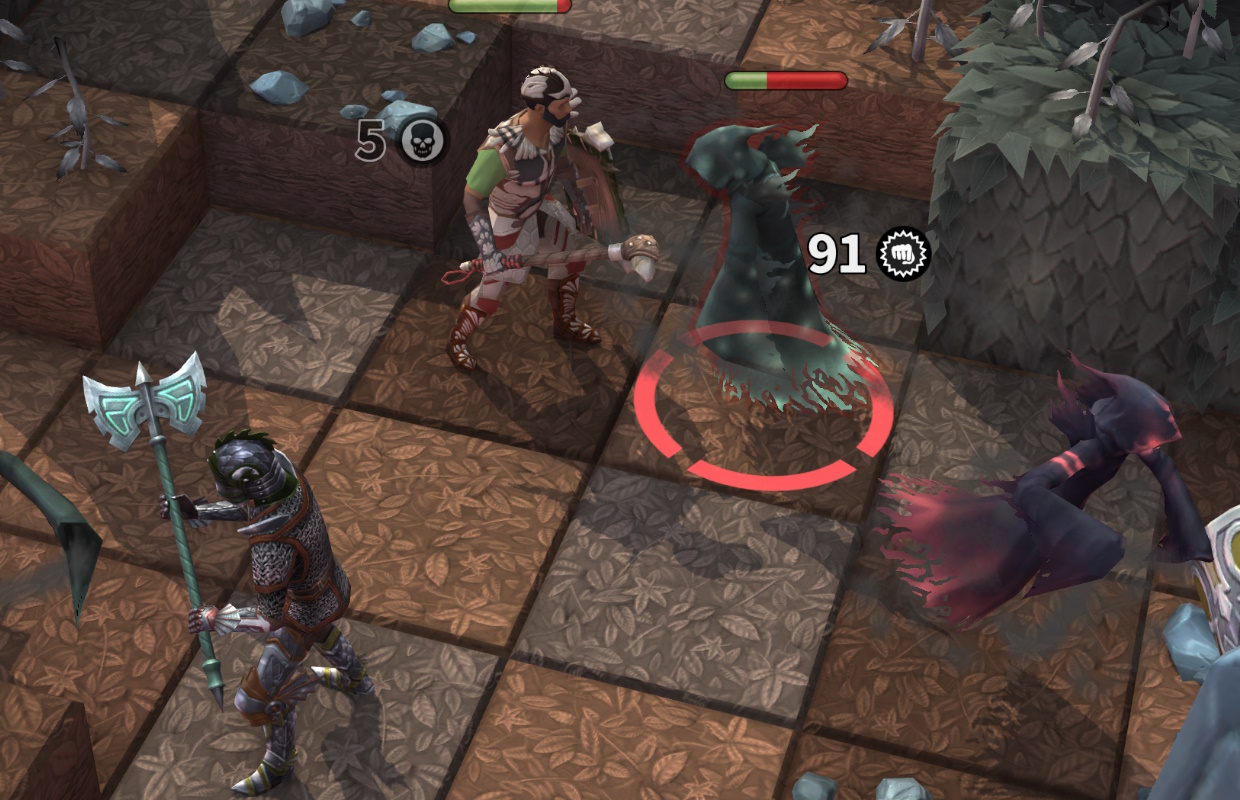
As someone who’s spent countless hours navigating the digital landscapes of Gielinor in RuneScape, I must say that Brighter Shores has managed to captivate me with its unique blend of low-intensity MMO gameplay and immersive world design. The dynamic soundtrack, reminiscent of a well-crafted board game, is nothing short of brilliant – it’s the kind of thing that makes you want to buy the soundtrack (if only it were available!).
It’s crucial to emphasize here that although Brighter Shores may share similarities with RuneScape, they are not the same game, nor is Brighter Shores intended to replace RuneScape. It’s inappropriate to compare a game still in Early Access with a fully-fledged title that has benefited from years of development and live service. I’ll elaborate on the differences further, but for now, understand that it’s unjust to make such comparisons.
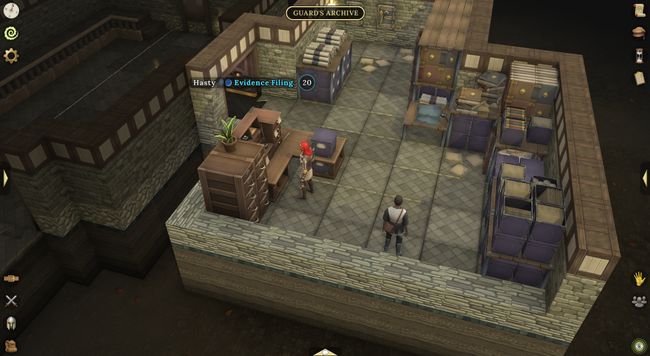
But even if you wanted to compare it to an older version of RuneScape, think about this: if I asked you to recall your favorite moment from RuneScape, assuming you played it at some point in your life, odds are good you would recall a time from around 2006 to 2009, give or take a few years. Considered the hey-day of the decades-old MMO, it was popular enough to get a spin-off of the main game (commonly known as Old-School RuneScape). Even then, 2007-ish RuneScape had several years of time as a live-service game already clocked in.
Contrarily, Brighter Shores has just been introduced to the public in Early Access. If you’re transitioning from RuneScape and thinking this new game will instantly replace it, you’ll likely be quite let down. But if you’re open to a fresh perspective and understand that Brighter Shores isn’t aiming to replicate RuneScape, but rather forge its unique path, you might appreciate the change of scenery. Nevertheless, there are certain elements from RuneScape that could have been incorporated, if the developers saw fit.
Starting afresh, let’s discuss Brighter Shores, an innovative point-and-click MMO spearheaded by Andrew Gower and his team at FenResearch. Notably, Gower is one of the founding creators of RuneScape, which gives credibility to this exciting venture. The development of Brighter Shores commenced back in 2012, and the idea behind it is straightforward: fans have been eager for a new MMO from Gower, and he’s delivered on that demand.
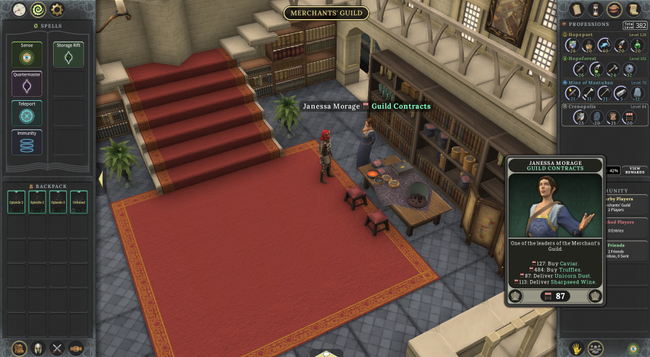
Upon stepping into the world of Brighter Shores, the resemblance to RuneScape becomes apparent right away – your character navigates on a grid with an overhead camera view, there are objects to click and interact with for exploration, collection, combat, and you possess various skills that develop independently but overlap in function. In essence, these are the primary points of comparison, although they share very few other features.
Instead of dropping you directly into the world like RuneScape post tutorial island, Brighter Shores guides your progression with a structured set of guidelines. You’ll need to master essential skills such as combat, potion-making, foraging, and more to become an effective Guard, but you won’t be able to rush off to the final zone of Crenopolis right away. This structured approach can help alleviate the overwhelming sense of choice paralysis that some new RuneScape players might experience.
In the game Brighter Shores, I’ve found that while there are several paths to choose from, there are certain rules to follow if you want to advance. For instance, moving from Chapter 1 to Chapter 2 necessitates reaching level 20 in Guard and a total level of 60 in Hopeport. As experience accrual becomes significantly steeper at level 20, it’s practically impossible for an average player to grind Guard up to level 60 alone. So, it’s essential to engage with the other four skills available to make progress.

To finish Chapter 4, a player needs Crenopolis Level 60 and a Total Level of 342, which is challenging since these can’t be mastered in one skill alone. This means the concept of “pures” (characters specialized in only one skill) becomes less viable, as exploring the entire game demands a balance of skills. This shift in design philosophy, though different, is not undesirable. As you advance through the main story, new skills will gradually unlock, and eventually, you’ll have them all. By this stage, you should have a clear idea of what areas to specialize in for your gaming experience.
The feeling of playing an MMO board game is not lost on me — traversing a grid-based environment, unlocking new rooms to explore, having set locations to deposit materials and loot, all of it makes you genuinely feel like you’ve cracked open your copy of Descent: Legends of the Dark. Although, I would argue that the combat in that game is leagues more involved…
The combat in RuneScape wasn’t hard to grasp – it always remained straightforward, even after the Evolution of Combat update (which was a major overhaul to resemble other MMOs by introducing cooldowns and queued abilities). Essentially, it boiled down to two characters taking turns to hit each other with swords while numbers flashed up. The majority of non-PvP encounters required minimal skill, except for some challenging bosses that needed gear changes, precise movement based on ticks, or the strategic use of prayer benefits that flickered at specific times.
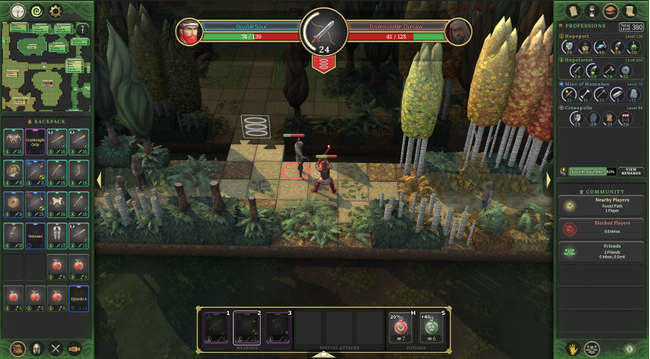
It’s logical to assume that Brighter Shores is also straightforward, yet it leaves me yearning for more depth. You can carry three types of weapons (a one-handed weapon and a shield, a two-handed weapon, and a ranged weapon) and switch between them during battles as you wish. However, aside from equipping gear with better stats, there isn’t much substance to it. Despite the promises of skills, magic, and abilities, I haven’t encountered any combat strategies in my 60 hours of gameplay.
In terms of relevant abilities, you’ll find four combative skills, yet they all serve the same purpose. Initially, your Guard level empowers you to battle tougher opponents in Chapter 1, but it doesn’t impact your fighting capacity in Chapters 2 and onward. Similarly, my Watchmen level surpasses other combat skills, however, equipment from Chapter 4 can only be utilized in Chapter 4. Should I venture back to Chapter 1 for a mission, I must exchange the gear for Chapter 1 equivalents.
I’m not particularly fond of this setup because one of the thrills in discovering new equipment is the freedom to carry it around with me. For instance, if I stumble upon a Dragon Scimitar for the first time, you can bet your boots I’ll be bringing it along on all my adventures. Unfortunately, in the game Brighter Shores, I possess a Legendary Quarterstaff at the highest tier, but I’m restricted from taking it with me outside of Chapter 4, and that’s quite frustrating.
It’s great that the gear-changing system is effortless – all you need is your Quartermaster magic and a click on the “auto-equip” button to choose a chapter. The game will then equip the finest gear you possess, store the old one automatically for you, which is quite convenient. You can use this magic anywhere, making the process of changing gear very accessible. I only wish that I could take gear from one chapter to another.
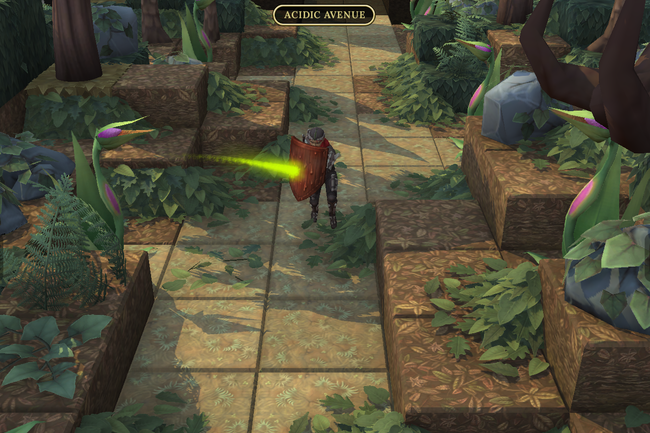
I think the biggest selling point of Brighter Shores, beyond being a very low-intensity MMO with plenty of skills to make numbers go up, is the design of the world, from the visuals to the music. The sound designers have crafted a beautiful dynamic soundtrack, so that the music shifts in cadence as you enter and exit various situations. What was a relatively calm exploration melody may suddenly become an excitable march as you enter combat, or an somewhat uplifting tune becomes a jaunty knee-slapper as you enter a tavern, that sort of thing. It’s fantastic and I would buy the soundtrack immediately if it were available.
In this game, the design of board games influences the changing landscapes around you. For instance, as you depart from the forest, you’ll notice decaying wood and caves replacing lush greenery; similarly, leaving the city via a boardwalk will transform into beautiful beaches. The world is filled with fascinating items to discover, but it’s a pity that there aren’t interactive infographics like in RuneScape, where you could simply right-click an object for details. Instead, these details are provided on cards you receive after interacting with the objects, which slightly diminishes the immersion and interactivity of the game world.
Regarding the tale of Brighter Shores, I don’t have too many insights to share at this stage. It’s decent enough, but it’s quite sparse currently. Being in early access, this isn’t a concern as such, it just feels a bit dull. However, the side quests are another story altogether. They were like a warm welcome after a long journey, and they truly showcase RuneScape-esque quest design. One particular quest in Chapter 3 was strikingly similar to Elemental Workshop, causing me to even liken it so much that I made my character engage in passive activities and took a break from the game.
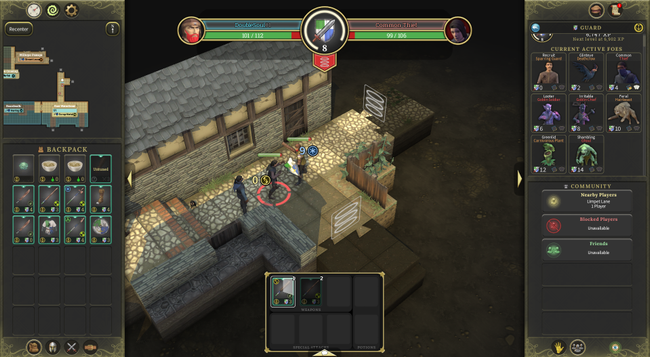
Discussing non-active learning methods, one appealing aspect of the game Brighter Shores lies in its passive skill training feature. In this mode, your character continues to develop a skill even when not actively playing, provided they have the necessary items or space in their inventory. The experience points gained per item are limited, making it slower compared to regular training, but setting it up before work or sleep ensures progress is made while you’re away from the game. To unlock this feature for a specific skill, you must first acquire Knowledge Points by playing the game conventionally and then spend them to learn the passive activity. This feature is fantastic, as it allows for steady progress even when I can’t play, a welcome change from my past where missing school for video games was a common occurrence.
I’ve got lots more to say about the intriguing directions I believe the development team is taking with Brighter Shores, but I’ll wrap it up by expressing that this MMO is looking exceptionally promising. It still has a significant journey ahead of it, but everything I’ve experienced so far gives me confidence in Gower and his team’s vision for the game. Despite its rough patches and incomplete aspects, having a well-defined roadmap makes it easy for me to place my trust in their plan.
To put your trust in this plan, it’s necessary to let go of the belief that this is a replacement for RuneScape. Brighter Shores is aiming for a unique destination within the MMO genre, and I, for one, am eager to be part of this adventure. The initial two chapters are accessible for free, allowing you to test it out and decide if it appeals to you. However, please remember that you’re diving into an early access version of what will eventually be fully realized.
Brighter Shores is out now in Early Access on Steam.
Read More
- Hades Tier List: Fans Weigh In on the Best Characters and Their Unconventional Love Lives
- Smash or Pass: Analyzing the Hades Character Tier List Fun
- Why Final Fantasy Fans Crave the Return of Overworlds: A Dive into Nostalgia
- Sim Racing Setup Showcase: Community Reactions and Insights
- Understanding Movement Speed in Valorant: Knife vs. Abilities
- Why Destiny 2 Players Find the Pale Heart Lost Sectors Unenjoyable: A Deep Dive
- How to Handle Smurfs in Valorant: A Guide from the Community
- Honkai: Star Rail’s Comeback: The Cactus Returns and Fans Rejoice
- Dead by Daylight: All Taurie Cain Perks
- Dead by Daylight Houndmaster Mori, Power, & Perks
2024-11-06 13:26